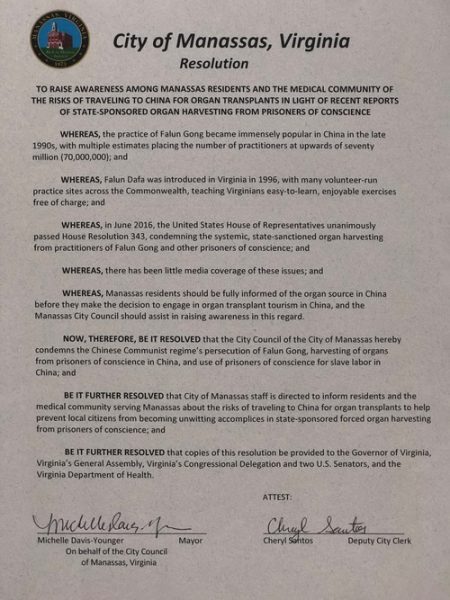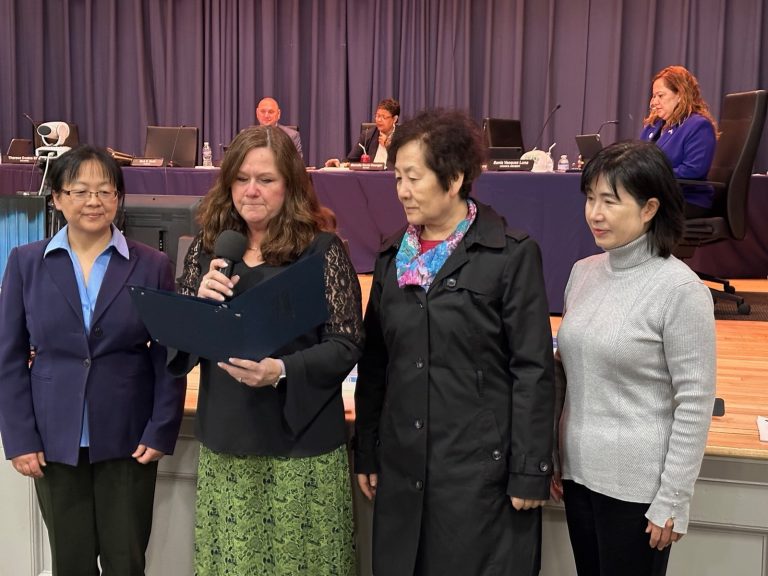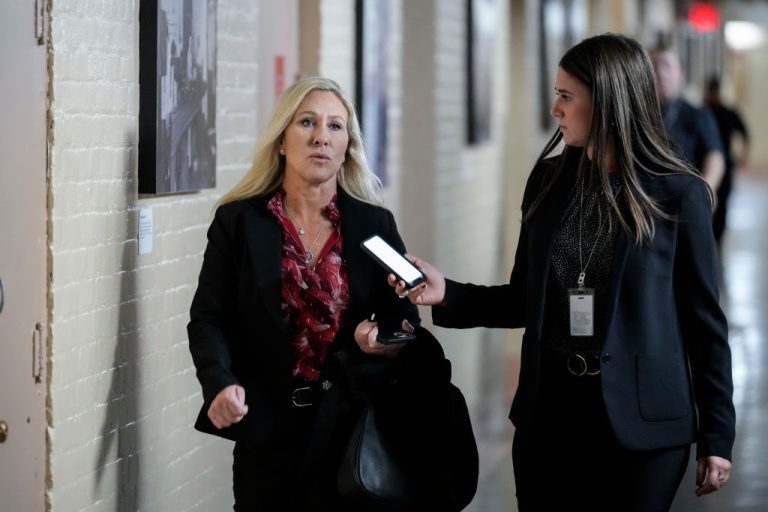MANASSAS, Virginia — The City of Manassas, Virginia, has passed a resolution condemning China’s state-sanctioned organ harvesting from prisoners of conscience as well as the communist regime’s persecution of Falun Gong, joining five other Virginia cities that passed similar resolutions in the past two years.
The resolution, adopted by the City Council on Nov. 27, 2023, and signed by the City’s Mayor, Michelle Davis-Younger, on behalf of the council, aimed to raise awareness among Manassas residents and the medical community of the risks of traveling to China for organ transplants.
The Manassas City Council’s stand is in light of recent reports of systemic state-sanctioned organ harvesting from prisoners of conscience, with Falun Gong (also known as Falun Dafa) and other religious minorities such as Uyghur Muslims and Christians being targeted.
Falun Gong is a traditional Chinese spiritual practice involving meditation and moral improvement. It gained tens of millions of adherents in the 1990s, but was banned by the Chinese Communist Party (CCP) leadership in 1999 and subject to a deadly persecution campaign.
- EXCLUSIVE: Retired Chinese Doctor Recounts Live Organ Harvesting in Military Hospital
- Virginia State House Passes Resolution to Condemn Forced Organ Harvesting in China
- US Senator Condemns CCP Over Death of Falun Gong Practitioner Beaten and Tortured In Police Custody
“Manassas residents should be fully informed of the organ source in China before they make the decision to engage in organ transplant tourism in China,” the council stated in the resolution, adding that the City Council should assist in raising awareness in that regard.
Success
You are now signed up for our newsletter
Success
Check your email to complete sign up
“Now, therefore, be it resolved that the City Council of the City of Manassas hereby condemns the Chinese Communist regime’s persecution of Falun Gong, harvesting of organs from prisoners of conscience in China, and use of prisoners of conscience for slave labor in China.”
An important reminder to the public
In a show of solidarity with the Falun Dafa practitioners, Manassas Vice Mayor, Pamela Sebesky, presented the resolution to local practitioners during the Council’s meeting. She emphasized that the resolution was an important reminder to the public that even today, millions in China continue to suffer cruel persecution and inhuman treatment for their faith.
Having one of the world’s largest organ transplant industries, China’s organ tourism has become increasingly popular in recent years due to relatively cheap transplant cost and readily available organs, with about 60,000 to 90,000 organ transplants per year, according to a 2021 report published by Amnesty International UK.
However, the continuing organ harvesting from prisoners of conscience in China continues to spark human rights concerns globally, with the US House of Representatives, the EU Parliament, and the Italian Commission for Human Rights condemning the inhuman practice. Australia banned its hospitals from training Chinese citizens to be surgeons while Israel, Italy, Spain, Canada, France, and Taiwan enacted bans on organ tourism to China.
Ms. Tang, a local Falun Gong practitioner present at the meeting, thanked the council for supporting their group’s religious freedom. In her speech, Ms. Tang emphasized that the council’s action was “particularly meaningful” as Falun Gong practitioners in China faced imprisonment, torture, and death because of their faith, while Americans are free to celebrate their traditional religious festivals in peace and joy. She added that the resolution would bring blessings to the City.
- Falun Gong Parade Held in Manhattan to Celebrate the Spiritual Practice’s Founding
- Chinese Persecution Survivor Warns of Transnational Repression in the West
- Child and Bride Trafficking in China Linked to Organ Harvesting: Activist Report

Wang Chunyan, a Falun Gong practitioner who experienced the persecution in China’s labor camps firsthand and worked with the City officials to pass the resolution, shared her experiences with the American people to let them know that there are still regimes that sanction such heinous treatment of some minority groups due to their religious beliefs.
Ms. Wang appealed to the civilized world to unite and work together to stop such persecution to allow mankind to return to normality and morality. Manassas’ resolution follows many other similar resolutions passed in some U.S. states, cities, and counties.
In June 2016, the United States House of Representatives unanimously passed House Resolution 343, condemning state-sanctioned organ harvesting from practitioners of Falun Gong and other prisoners of conscience, amid increasing concerns of gross human rights violation under the CCP regime.
- Agents of Communist China Arrested for IRS Bribery Scheme Targeting Falun Gong in the US
- House of Representatives Passes ‘Stop Forced Organ Harvesting Act’
- China’s ‘Global Police State’: New Report Unravels the CCP’s Transnational Repression and Its Impact on US National Security
Mounting evidence and recognition of organ harvesting by the CCP
Reports of state-sanctioned organ harvesting from Falun Gong prisoners first got to the public in 2006, but the practice is alleged to have begun in the early 2000s, with several researchers pointing to a massive organ transplant in China which cannot be sustained by a conventional organ donor system, given the extremely low number of voluntary donors in the country.
China’s organ transplant industry boomed right after the beginning of the persecution of Falun Gong in 1999.
According to a report by former lawmaker David Kilgour, human rights lawyer David Matas, and journalist Ethan Gutmann, tens of thousands of political prisoners, mainly from Falun Gong group were being executed “on demand” to supply vital organs for the booming organ transplant business in China worth over $1 billion annually.
The CCP authorities have rejected all allegations of forced organ harvesting from prisoners of conscience, without providing any explanation for the specific concerns detailed by human rights groups and investigators. In 2015, Chinese officials admitted that death-row prisoners had been used as organ donors, but claimed that this practice had ended.
Moreover, the Chinese government has since kept its execution figures, organ donor list, and organ transplant data a state secret, breaching the WHO’s requirements for transparency and traceability in organ procurement pathways.
In December 2018, the UK-based China Tribunal, tasked to investigate reports about organ harvesting from prisoners of conscience in the communist state, concluded that “Forced organ harvesting has been committed for years throughout China on a significant scale and that Falun Gong practitioners have been one — and probably the main — source of organ supply.”
“Forced organ harvesting is of unmatched wickedness even compared – on a death for death basis – with the killings by mass crimes committed in the last century,” the Tribunal noted in its judgement deliver at a sitting in London.
- The Plight of Falun Gong: 24 Years of Persecution in China and Beyond
- Chinese Exile in Germany Strives for International Support to Release His Father
- CCP Sentences Falun Gong Adherents Who Developed Great Firewall Bypass Software
The Tribunal also added that there was “numerical evidence” showing the “impossibility of there being anything like sufficient ‘eligible donors’” matching the number of transplants.
According to the Tribunal, allegations of forced organ harvesting first came to light in 2001, after a boom in transplant activity in China, with shorter waiting times, the statement said, further adding that Chinese websites advertised transplants of vital organs such as the hearts, lungs and kidneys, with the organs available to book in advance, suggesting that the victims were killed on demand.
In June 2021, United Nations human rights experts issued a chilling warning that “they were extremely alarmed by reports of alleged ‘organ harvesting’ targeting minorities, including Falun Gong practitioners, Uyghurs, Tibetans, Muslims and Christians, in detention in China.”
“Despite the gradual development of a voluntary organ donation system, information continues to emerge regarding serious human rights violations in the procurement of organs for transplants in China,” the U.N. experts added.
Prior to Manassas, 25 counties and at least five cities across Virginia had already passed resolutions condemning the CCP’s persecution of Falun Gong as of December 2023.













